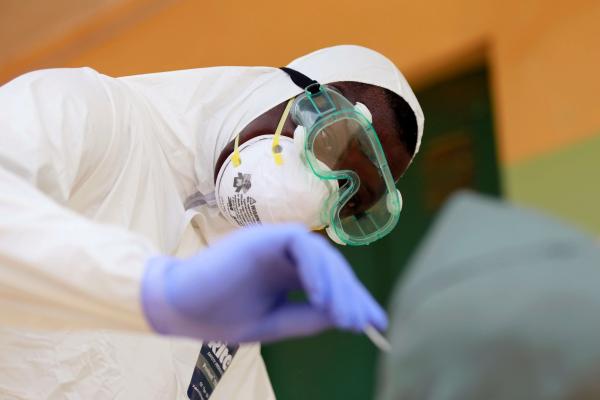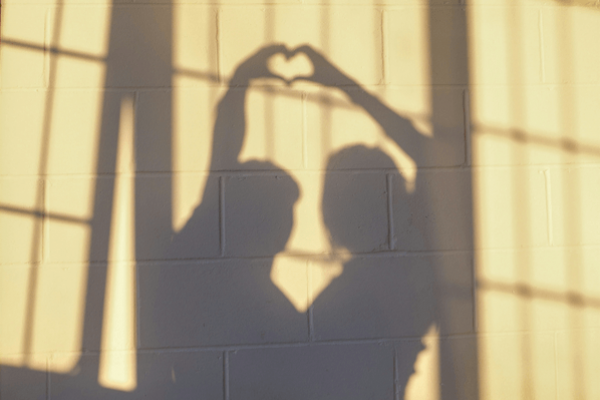This Easter season, these often quoted words shine a timeless hope in these dark times: “For God so loved the world that he gave his only begotten son” (John 3:16). Unfortunately, the American church is far too often nationalistic in its lived theology, as though these eternal words apply first and foremost to our own country rather than to all of humanity — as if the Gospel instead selfishly proclaimed, “For God so loved the United States that he gave his only begotten son.”
But God’s love applies equally to all nations, enveloping the entire world in the promise of new life in all of its fullness. And the COVID-19 crisis shows how in an increasingly interconnected world, our lives, and wellbeing in our own nations are inextricably linked to the health of the rest of the world.
The world has surpassed 2 million COVID-19 cases. And tragically the actual number of cases is almost assuredly astronomically higher than this figure given the severe lack of testing and good data in many parts of the world.
Global crises, including this COVID-19 pandemic, have the power to either bring the world closer together in response to a common threat, or drive us further apart by bringing out our most nativist and provincial impulses. Since the United States tragically became the global epicenter of the pandemic with the highest absolute number of both infections and deaths, it is understandable that we have focused most of our time, attention, and resources on addressing the domestic impact of the virus. But the best of American values and the mandates of our faith call on us to show equal concern and solidarity with our brothers and sisters around the world. Our global leadership will be indispensable to bending the curve in many countries around the world, which has the potential of preventing millions of deaths and unspeakable suffering. I can’t think of a more urgent way to protect the sanctity of life and safeguard human dignity.
Congress did include some additional resources in the CARES Act and other recent legislation, including $258 million in additional funding for USAID’s International Disaster Assistance account, $95 million for the agency’s operating expenses budget, $350 million for the State Department-managed Migration and Refugee Assistance account, $985 million appropriated to USAID in the initial supplemental package, and authorization for additional payments to international financial institutions like the World Bank and International Monetary Fund. But these measures pale in comparison to the global need.
Making matters worse, this week President Donald Trump decided to focus his ire on the World Health Organization, pledging to freeze desperately needed U.S. funds until an investigation is conducted around whether the WHO was overly deferential to the Chinese government in the early days of the pandemic when the Chinese Communist Party sought to downplay the threat the virus posed. This is the epitome of hypocrisy in light of Trump’s earlier public praise of China’s handling of its outbreak and his own refusal to act decisively in the months of February and early March despite the repeated warnings of his national intelligence and public health experts.
The WHO has become the latest scapegoat in Trump’s politics of blame and lies, which seem to be his tactics of choice for deflecting attention from his own incompetent and erratic leadership. While scrutiny surrounding WHO’s early response to the coronavirus threat is warranted, we desperately need the WHO’s global public health reach, expertise, and resources to arrest the spread of the virus around the world. The delayed impact of COVID-19 in many parts of the developing world gives us a crucial window of opportunity to mitigate its most devastating impacts. With the right support and leadership, the world may even be able to further assist many countries in getting out ahead of the infection curve and even containing the pandemic through rapid and broad testing, contact tracing, and isolation.
Over the weekend, The New York Times Editorial Board put the global threat of COVID-19 into stark perspective, writing:
For much of the rest of the world, the nightmare is yet to start. And part of the horror is that many poorer countries won’t have the means to do much about it. Nor, given the international community’s lack of organization and leadership in the face of a global crisis, can they count on richer nations to help them … What probably lies ahead is the spread of the coronavirus through countries ravaged by conflict, through packed refugee camps and detention centers in places like Syria or Bangladesh, through teeming cities like Mumbai, Rio de Janeiro or Monrovia, where social distancing is impossible and government is not trusted, through countries without the fiscal capacity or health services to mount a viable response. That would be disastrous not only for them but also for the rest of the world as supplies of raw materials are disrupted, fragile economies collapse, strongmen grow stronger and the virus doubles back to reinfect northern regions.
There’s an old saying in the African-American community that has now taken on an even more tragic meaning: When white folks catch a cold, black folks catch pneumonia. The alarmingly disproportionate infection and death rate between African Americans and white Americans has only recently captured headlines and requires our attention. What is true for disparities between black and white Americans will also likely be true for disparities between many parts of the wealthy world and the most impoverished parts of the world.
Given the incubation period of the virus and lack of testing in many parts of sub-Saharan Africa, South Asia, and the Middle East, our current understanding of the state of the global pandemic is tenuous. The worst of COVID-19 is likely on the horizon. And countries with weak health systems, nearly nonexistent social safety nets, poor governance, and ongoing conflict are the most at risk. It is also critical to recognize the more profound challenges that staying at home and physical distancing means for billions of the world’s people who don’t have an adequate home, are already food insecure, and lack access to clean water or basic hygiene that is so critical to preventing the virus’ spread.
Growing up, I learned little about the 1918 H1N1 influenza pandemic (often called the Spanish Flu). Instead of being a footnote in our U.S. history classes, it should have been a major focus and cautionary lesson for what could likely come. The 1918 pandemic killed more than 50 million people in the aftermath of World War I, far more people than were killed in one of the world’s most deadly and catastrophic wars. An estimated 675,000 Americans lost their lives over two years, which is a staggering number. Yet another 49 million lost their lives around the world with some of the highest death tolls in India and other parts of the developing world.
According to a recent Oxfam report,“unless dramatic action is taken to shore up the economies of developing countries, the crisis could push as many as half a billion people into poverty. This could set back the fight against poverty by a decade, and in some cases by as much as 30 years … Unchecked, the virus could take as many as 40 million lives.”
As someone who long championed the Millennium Development Goals and now is working to achieve the Sustainable Development Goals, this news is heartbreaking. Oxfam estimates that at least $2.5 trillion is needed to tackle the pandemic and prevent global economic collapse.
In this moment, the world must prioritize helping people directly. We need an increase in aid and a one-off economic stimulus from the IMF. Furthermore, we must suspend the debt payments of poor countries and distribute cash grants. The Advocacy Network for Africa (ADNA) is calling on Congress to increase the current $100 million pledge to $300 million in order to boost the Africa COVID-19 capabilities of the African Union, the United Nations, the World Health Organization, and the U.N. High Commissioner for Refugees, and UNICEF. Jubilee USA and the U.S. Conference of Catholic Bishops recently led a call for the suspension of debts. This would free countries up to access funds that would bolster their health and economic systems. The World Bank Group also recently announced it is prepared to deploy up to $160 billion over the next 15 months to support COVID-19 measures.
The HIV/AIDS pandemic started primarily as an American and European epidemic. But over the course of a decade, it spread across the world. By the late 1990s and early 2000s, sub-Saharan Africa faced the most devastating consequences of the pandemic. As the world started to awaken to the harrowing statistics about the AIDS crisis in Africa, I joined a movement of activists in calling on the United States to invest more money in the fight against AIDS in Africa. While initially decisionmakers dismissed and ignored us, we eventually convinced Congress and the Bush administration that the AIDS pandemic threatened our economic and national security. In 2003, President Bush pledged $15 billion over five years to fund prevention and treatment programs across sub-Saharan Africa and the Caribbean, which was a bold and game-changing initiative.
Nearly 20 years later, we must again push our government to expand global aid to fight the COVID-19 pandemic. As Christians, the moral imperative is clear. But in order to convince the powers that be, we must also argue that protecting the American economy and our national public health requires that we move from investing millions to investing billions — perhaps even trillions — in order to mount an adequate global response.
COVID-19 represents a true test of global leadership. The virus makes a mockery of the politics of lies, denial, and delay. The pandemic also opens the door to the increased risk of repression and authoritarianism. Just a few alarming examples include Peru, which handed its president broad new legislative authority; Israel, which sharply ramped up the reach of its surveillance state; further crackdowns in Egypt; and the bizarre and negligent response of Nicaraguan President Daniel Ortega, who has yet to come to grips with the pandemic. Across the world, as legislatures limit or suspend activities in the name of social distancing, there’s a danger that the norms that define democracy — elections, deliberation and debate, checks and balances — will be undermined and sacrificed.
Fortunately, there are many signs of hope around the globe, including through the witness and response of the church. Rev. Aiah Foday-Khabenje, General Secretary of the Association of Evangelicals in Africa told me this week, “There is never a shortage of a willingness of people to help, including churches working to feed their communities and church-state cooperation to broadcast services.”
Ruth Padilla DeBorst shared that networks of pastors and theologians across Latin America are coming together to educate churches about how to best answer theological questions, like, “Where is God in the midst of this?” Many church leaders in Brazil are challenging President Jair Bolsanaro’s reckless efforts to keep the Brazilian economy open, making the case that love of neighbor demands civic responsibility.
In an Easter letter to social movements around the world, Pope Francis made the case for a universal basic wage and offered some prophetic encouragement, writing:
I hope that this time of danger will free us from operating on automatic pilot, shake our sleepy consciences and allow a humanist and ecological conversion that puts an end to the idolatry of money and places human life and dignity at the centre. Our civilization — so competitive, so individualistic, with its frenetic rhythms of production and consumption, its extravagant luxuries, its disproportionate profits for just a few — needs to downshift, take stock, and renew itself.
Dr. Martin Luther King Jr. famously said that “injustice anywhere is a threat to justice everywhere.” His words represent a powerful remix of the words of the Apostle Paul, who compared the church to a human body, writing that “when one part of the body suffers, all parts suffer with it.”
In the face of the COVID-19 crisis, the virus’ destructive presence anywhere is a threat to our health everywhere, and if one country suffers due to a new outbreak, all countries will be more at risk and will likely suffer with it. There is no greater test of our understanding of and commitment to our global interdependence. Now is the time for bold global leadership.
Got something to say about what you're reading? We value your feedback!







